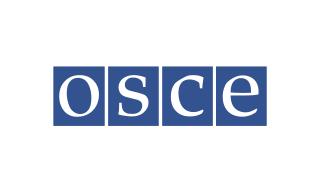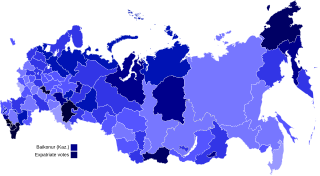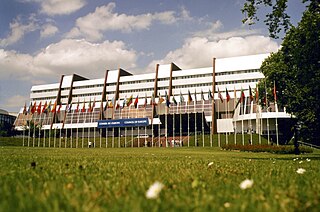
The Organization for Security and Co-operation in Europe (OSCE) is a regional security-oriented intergovernmental organization comprising member states in Europe, North America, and Asia. Its mandate includes issues such as arms control, the promotion of human rights, freedom of the press, and free and fair elections. It employs around 3,460 people, mostly in its field operations but also in its secretariat in Vienna, Austria, and its institutions. It has observer status at the United Nations.

The Inter-Parliamentary Union is an international organization of national parliaments. Its primary purpose is to promote democratic governance, accountability, and cooperation among its members; other initiatives include advancing gender parity among legislatures, empowering youth participation in politics, and sustainable development.

Presidential elections were held in Russia on 14 March 2004. Incumbent President Vladimir Putin was seeking a second full four-year term. It was a landslide victory for Putin, who was re-elected with 72% of the vote.

Election monitoring involves the observation of an election by one or more independent parties, typically from another country or from a non-governmental organization (NGO). The monitoring parties aim primarily to assess the conduct of an election process on the basis of national legislation and of international election standards. There are national and international election observers. Monitors do not directly prevent electoral fraud, but rather record and report instances of suspicious practices. Election observation increasingly looks at the entire electoral process over a long period of time, rather than at election-day proceedings only. The legitimacy of an election can be affected by the criticism of monitors, unless they are themselves seen as biased. A notable individual is often appointed honorary leader of a monitoring organization in an effort to enhance legitimacy of the monitoring process.

The NATO Parliamentary Assembly serves as the consultative interparliamentary organisation for the North Atlantic Treaty Organization. Its current President is Michał Szczerba from Poland, elected in 2023. Its current Secretary General is Ruxandra Popa, who has been in this position since January 2020.

The National Assembly of Armenia, also informally referred to as the Parliament of Armenia is the legislative branch of the government of Armenia.

The Senate of Kazakhstan is the upper house of two chambers in Kazakhstan's legislature, known as the Parliament (Parlamenti). The Senate is composed of elected members: two from each region and two from three municipalities which are Almaty, Astana, and Shymkent.

The Congress of Local and Regional Authorities is the pan-European political assembly representing local and regional authorities from the forty-six member states of the Council of Europe. Its role is to promote local and regional democracy, improve local and regional governance and strengthen authorities' self-government, according to the principles laid down in the European Charter of Local Self-Government. It is made up of two chambers, the Chamber of Local Authorities and the Chamber of Regions and holds its plenary sessions twice a year at the Palace of Europe in Strasbourg, where its permanent Secretariat is located.
Pia Christmas-Møller is a Danish politician, a member of parliament from 1987 until 2011. She represented the Conservative People's Party from 1987 until 2007 and led her party between 1998 and 1999. From 2007 until 2011 she sat as an Independent.

Ilkka Armas Mikael Kanerva was a Finnish politician and a member of the Parliament of Finland. He was born in Lokalahti, now a part of Uusikaupunki in Southwest Finland. He was the Minister for Foreign Affairs from 2007 to 2008. Kanerva was a member of the National Coalition Party.

The Parliamentary Assembly of the Union for the Mediterranean (PAUfM), previously known as the Euro-Mediterranean Parliamentary Assembly (EMPA), established in Naples on 3 December 2003 by decision of the Ministerial Conference of the Euro-Mediterranean Partnership, is an institution of the Barcelona Process. The EMPA opened its proceedings in Vouliagmeni (Athens) on 22 and 23 March 2004. Its first Bureau comprises the Presidents of the Egyptian People's Assembly, the European Parliament (EP), the Tunisian Chamber of Deputies and the Greek Parliament.
The Vilnius Declaration was a declaration adopted by the Organization for Security and Co-operation in Europe (OSCE) during the 18th annual session of its parliamentary assembly, that took place in Vilnius from 29 June to 3 July 2009.
Council of Europe Parliamentary Assembly (PACE) Resolution 1416 (2005), titled “The conflict over the Nagorno-Karabakh region dealt with by the OSCE Minsk Conference”, is a resolution of PACE about the situation on occupied territories currently in the possession of Azerbaijan by Armenian military forces, adopted by PACE on January 25, 2005.

The Parliamentary Assembly of the Mediterranean (PAM) is an international organization established in 2005 by the national parliaments of the countries of the Euro-Mediterranean region. It is the legal successor of the Conference on Security and Cooperation in the Mediterranean (CSCM), launched in the early 1990s.

R. Spencer Oliver was the first Secretary General of the Organization for Security and Co-operation in Europe's Parliamentary Assembly. A lawyer by training, Oliver previously served 22 years as a staff member in the U.S. Congress, including as Chief of Staff of the U.S. Helsinki Commission from 1976 to 1985 and as Chief Counsel of the Foreign Affairs Committee of the U.S. House of Representatives until January 1993. He also served in several senior diplomatic positions on U.S. delegations to CSCE Review and Expert Meetings between 1977 and 1993. Long active in Democratic Party politics, Oliver's phone was tapped in the Watergate scandal.
Pia Liisa Kauma is a Finnish politician who serves as a Member of the Finnish parliament and as a member of the City Council of Espoo, representing the National Coalition Party. Kauma is also a member of the Finnish delegation of the Parliamentary Assembly of the Organization for Security and Co-operation in Europe and currently serves as the president of the organization.

Azay Guliyev is the Chair of the OSCE Parliamentary Assembly General Committee on Economic Affairs, Science, Technology and Environment, Chair of the Silk Road Support Group within the OSCE PA, Coordinator of the Baku Parliamentary Platform for Dialogue and Cooperation, Head of Delegation of Azerbaijan to the OSCE PA and the Member of Parliament of the Republic of Azerbaijan.

Matteo Mecacci is an Italian diplomat serving as director of the OSCE's Office for Democratic Institutions and Human Rights (ODHIR). In the past, he was a Radical Party Member of Parliament in Italy and elected in the lists of the Democratic Party, President of the International Campaign for Tibet and leading advocate for the International Criminal Court, the abolition of the death penalty, religious freedom and other prominent human rights campaigns.
Hripsime Grigoryan is an Armenian politician of the Civil Contact. She is a member of the National Assembly of Armenia since 2018.

Armenia–OSCE relations began when Armenia joined the OSCE's predecessor, the Conference on Security and Cooperation in Europe (CSCE), on 30 January 1992. The CSCE transformed into the Organization for Security and Co-operation in Europe (OSCE) shortly afterwards in 1995.














